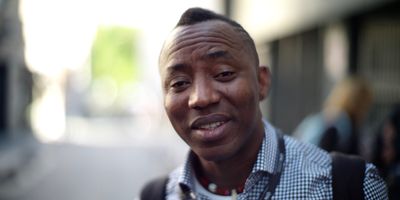Activists Demand the Release of Omoyele Sowore and Other Political Detainees, Amidst Growing Attacks on Freedom of Press In Nigeria
"It feels like the '90s again," says Sowore's wife Opeyemi Sowore, about the recent crackdowns on political dissidents in Nigeria.
Image by Mohamed Nanabhay via Flickr.
On August 3, activist and founder of Sahara Reporters, and former presidential candidate Omoyele Sowere was arrested for planning a peaceful protest in Nigeria. Fifty-four days later, he remains in custody.
Sowere has been hit with a seven-count charge, including money laundering, treason, as well as "cyberstalking the president," Sahara News reports. He is scheduled to appear in court tomorrow after being jailed for nearly two months, according to his wife Opeyemi Sowore.
He, along with several activists who have voiced political dissent in recent months have been detained by Nigerian authorities, denoting an upward shift on crackdowns on members of the press and attacks on basic civil liberties in Nigeria under President Muhammadu Buhari's administration. "This truly is a threat to freedom of press, freedom of speech and expression," Sowore tells OkayAfrica. "As much progress as we thought we had made, a lot of the events truly sadden me."
Others who have been arrested include fellow #RevolutionNow activists, Olawale Bakare another member arrested in Osogbo Nigeria. The movement's mission is to urge the government to take greater steps towards fighting insecurity, and advocate for improved education in the densely populated country.
Protests in support of Sowore took place last week, and another is set to occur at the Nigerian mission to the UN in New York City tomorrow, September 24, the same day as Sowore's first court appearance. There has been growing support for Sowore internationally, as several human rights activists across the diaspora have become involved in advocating for his release. Earlier this month a coalition of US and Nigerian activists, including Black Lives Matter co-founder, Opal Tometi, activist Folabi Olajbaju and more, sent a letter to the Nigerian ambassador to the United States, Sylvanus Adiewere Nsofor, demanding his immediate release. "The Nigerian people and people of good will around the world are watching," said Olabaju in a statement. "We will oppose all efforts to suppress the rights of the people and silence democracy defenders."
The letter also pushes for the release of several others who are believed to be unjustly detained by the Nigerian government. "Abubakar Idris, who has been held incommunicado after criticizing the Kano state government;" the letter reads. "Stephen Kefas, an activist in the tense Nigerian Delta oil fields imprisoned for more than three months for distributing a press report embarrassing to the state governor; journalists Agba Jalingo and Jones Abiri, who spent over two years in detention without charge; whistleblower George Uboh who exposed malfeasance at the Nigerian Central Bank; Olawale Adebayo, a pro-democracy activist arrested in August, and Muslim spiritual leader Sheik Ibraheem El-Zakzaky."
The arrests reveal the growing gaps in Nigeria's democracy—the largest in Africa which has implications for the rest of the continent. "It feels like the '90s again," says Sowore, referencing one of Nigeria's most politically turbulent periods under the dictatorship of Sani Abacha. "It's so important for democratic societies to have freedom of press. It's the only way to hold the government accountable."
